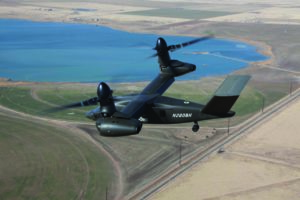Bell [TXT] has won the Army’s Future Long Range Assault Aircraft (FLRAA) program, the service announced on Monday evening, receiving an initial award worth up to $1.3 billion to provide the new platform that’s set to serve as the eventual UH-60 Black Hawk helicopter replacement.
Bell’s V-280 Valor tiltrotor aircraft design beat out a Sikorsky [LMT]-Boeing [BA] team’s Defiant X coaxial rigid rotor helicopter offering for the FLRAA competition.

Maj. Gen. Robert Barrie, the Army’s program executive officer for aviation, told reporters following the award announcement that the deal begins with an initial obligation of $232 million to Bell.
“I am excited to be part of this momentous day for our Army,” Doug Bush, the Army’s top acquisition official said in a statement. “The thoughtful and disciplined execution of the FLRAA program strategy will deliver the transformational capabilities we need to support the Joint force, strengthen deterrence and win in multi-domain operations.”
Bush told reporters that the Army has factored a potential protest of the award into its planned program timeline.
In March 2020, the Army selected Bell’s V-280 Valor and Sikorsky-Boeing’s Defiant designs to move onto the Competitive Demo and Risk Reduction phase for FLRAA after both had participated in the Joint Multi-Role Technology Demonstrator program to inform requirements since 2013 (Defense Daily, March 16 2020).
Bell announced last June it would retire its V-280 Valor technology demonstrator from active flight testing, after reaching 214 flight hours and a max speed of 305 knots, as it prepared for the Army’s official FLRAA program of record (Defense Daily, June 24 2021).
With the platform no longer flying, the company used the V-280 as a testbed to gather additional data on the ground to further assist its proposal for FLRAA.
Bell, which will produce the V-280 for FLRAA at its assembly facility in Amarillo, Texas, has opened a new Manufacturing Technology Center (MTC) in Fort Worth, Texas to refine production processes with advanced machines and research and development projects aimed at finding ways to rapidly manufacture critical components and help reduce long-term sustainment costs (Defense Daily, March 17).
Sikorsky and Boeing’ first detailed its updated Defiant X offering in January 2021, which built on on the SB>1 Defiant technology demonstrator platform the company has flown for several years, and is designed “to reduce thermal signature and improve aerodynamic handling” and features “fly-by-wire flight controls integrated with autonomy capability” (Defense Daily, January 25 2021).
Bell is also competing against Sikorsky for the Army’s Future Attack Reconnaissance Aircraft (FARA) program to find a new scout attack helicopter under the Army’s FVL initiative, with plans to fly the first prototypes next year.
The Army in late June signed the expected last multi-year UH-60 Black Hawk contract with Sikorsky, awarding the company a five-year deal worth $2.3 billion for delivery of 120 H-60M helicopters.
With options, the Army said the 10th multi-year deal for Black Hawks could potentially be worth $4.4 billion and cover up to 255 helicopters.